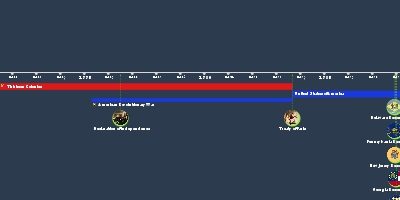Banana Wars (jan 1, 1898 – jan 1, 1934)
Description:
The Banana Wars were occupations, police actions, and interventions on the part of the United States in Central America and the Caribbean between the end of the Spanish–American War in 1898 and the inception of the Good Neighbor Policy in 1934. These military interventions were most often carried out by the United States Marine Corps, which developed a manual, The Strategy and Tactics of Small Wars (1921) based on its experiences. On occasion, the Navy provided gunfire support and Army troops were also used.With the Treaty of Paris, Spain ceded control of Cuba, Puerto Rico, Guam, and the Philippines to the United States. Thereafter, the United States conducted military interventions in Cuba, Panama, Honduras, Nicaragua, Mexico, Haiti, and the Dominican Republic. The series of conflicts ended with the withdrawal of troops from Haiti in 1934 under President Franklin D. Roosevelt.
The term was popularized in 1983 by writer Lester D. Langley. Langley wrote several books on Latin American history and American interactions including The United States and the Caribbean, 1900–1970 and The Banana Wars: An Inner History of American Empire, 1900–1934. His book on the Banana Wars encompasses the United States tropical empire that overtook the western hemisphere spanning both of the Roosevelt presidencies. The term was popularized through this writing which portrayed the United States as a police force that was sent to reconcile warring tropical countries, lawless societies and corrupt politicians, establishing a reign over tropical trade.
Added to timeline:
Date:
jan 1, 1898
jan 1, 1934
~ 36 years
